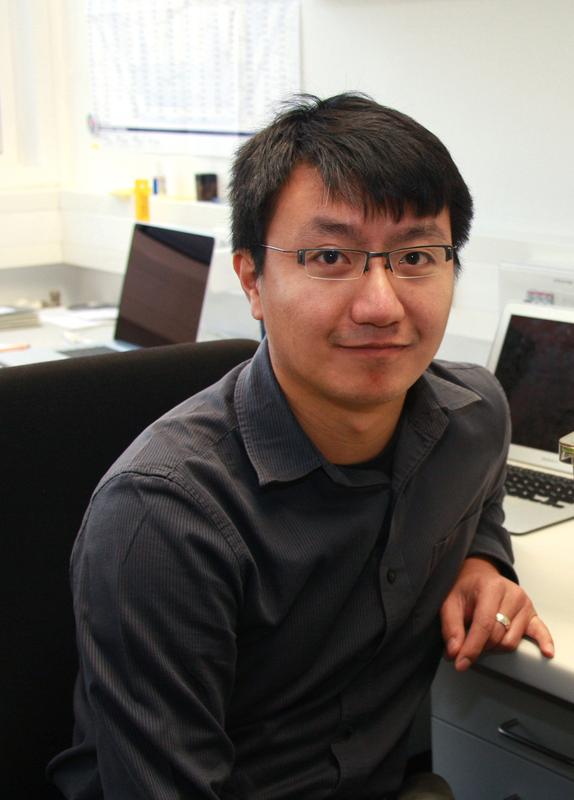Max Planck scientists receive 3 Million Euro award

Dr. Frank Chan, Friedrich-Miescher-Laboratorium Tübingen Brigitte Sailer, Max-Planck-Institut für Entwicklungsbiologie
The Friedrich Miescher Laboratory (FML) is the smallest research institute on the Max Planck Campus in Tübingen, Germany. Two of its research group leaders, Dr. Patrick Müller and Dr. Frank Chan, have been awarded an ERC Starting Grant for their work in basic research, with prize money of 1.5 Million Euros over a period of five years. The selection process for ERC Starting Grants is highly competitive: only one out of ten project proposals receive funding.
Patrick Müller’s research group combines genetics and biophysics with theoretical approaches to understand how signaling molecules pattern developing embryos and tissues. From 1999 to 2004, he studied molecular biology in Göttingen, Berkeley and New York. In 2007, he received his PhD from the Max Planck Institute for Biophysical Chemistry and worked as a postdoc and research associate at Harvard University until 2013.
Among the honors he received are the Otto Hahn Medal of the Max Planck Society, the Emmy Noether Program Award of the German Research Foundation (DFG), and a Career Development Award from the Human Frontier Science Program. Müller will use the generous funding from the ERC Starting Grant to recruit additional international experts for his research group.
Müller’s high-risk/high-gain approach has the potential to unravel general principles underlying self-organizing processes during development and will inform new strategies for human tissue engineering from embryonic stem cells. “This European award is also a positive sign for the excellence of Tübingen and for basic research in general”, he says.
Frank Chan focuses on understanding how genetic variations contribute to adaptation in vertebrates during adaptation, using the house mouse as a research model. Chan earned his PhD in Developmental Biology at Stanford University before his postdoctoral research as a Volkswagen-Stiftung research fellow at the Max Planck Institute for Evolutionary Biology in Plön. Among other discoveries, his work has detailed how the genomes of some of the largest house mice in the world, the Farese house mice, differ from French and German house mice.
In the new ERC project, Chan’s group deploys an innovative approach to study mouse speciation genetics in petri dishes. Using the latest stem cell and tissue engineering techniques, Chan’s group will investigate how gene functions evolve and diverge between mouse species since 3 million years ago.
Studying this question in mice has been enormously challenging in the past, because speciation genes tend not to work across species and produce sterile mouse hybrids. “Not only will we find out how genetic changes contribute to the origin of species, this project has the potential to identify treatment strategies for infertility,” explains Chan.
The Friedrich Miescher Laboratory plays a unique role in the Max Planck Society by supporting the innovative research programs of four young research groups in an independent institute with generous resources.
FML scientists have enjoyed success in previous ERC Grant competitions, with awards also made in 2013 and 2014. The newly awarded ERC Starting Grants for Patrick Müller and Frank Chan underscore the scientific excellence at the Friedrich Miescher Laboratory: all four FML research groups are now funded with ERC grants.
Media Contact
All latest news from the category: Awards Funding
Newest articles

Largest magnetic anisotropy of a molecule measured at BESSY II
At the Berlin synchrotron radiation source BESSY II, the largest magnetic anisotropy of a single molecule ever measured experimentally has been determined. The larger this anisotropy is, the better a…

Breaking boundaries: Researchers isolate quantum coherence in classical light systems
LSU quantum researchers uncover hidden quantum behaviors within classical light, which could make quantum technologies robust. Understanding the boundary between classical and quantum physics has long been a central question…

MRI-first strategy for prostate cancer detection proves to be safe
Active monitoring is a sufficiently safe option when prostate MRI findings are negative. There are several strategies for the early detection of prostate cancer. The first step is often a…



